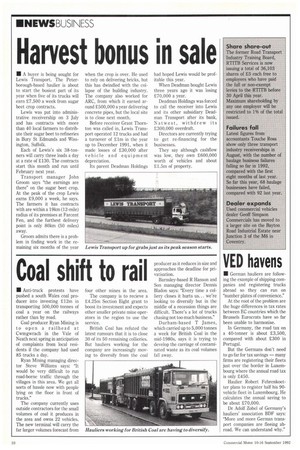Coal shift to rail
Page 12

If you've noticed an error in this article please click here to report it so we can fix it.
• Anti-truck protests have pushed a south Wales coal producer into investing £12m in transporting 500,000 tonnes of coal a year on the railways rather than by road.
Coal producer Ryan Mining is to open a railhead at Cwmgwrach in the Vale of Neath next spring in anticipation of complaints from local residents if the company had used 85 trucks a day.
Ryan Mining managing direc tor Steve Williams says: "It would be very difficult to run road-borne traffic through the villages in this area. We get all sorts of hassle now with people lying on the floor in front of trucks."
The company currently uses outside contractors for the small volumes of coal it produces in the area and owns 22 vehicles. The new terminal will carry the far larger volumes forecast from four other mines in the area.
The company is to recieve a £4.25m Section Eight grant to boost its investment and expects other smaller private mine operators in the region to use the service.
British Coal has refuted the latest rumours that it is to close 30 of its 50 remaining collieries. But hauliers working for the company are increasingly moving to diversify from the coal producer as it reduces in size and approaches the deadline for privatisation.
Barnsley-based R Hanson and Son managing director Dennis Bladon says: "Every time a colliery closes it hurts us... we're looking to diversify but in the middle of a recession things are difficult, There's a lot of trucks chasing not too much business."
Durham-based T James, which carried up to 5,000 tonnes a week for British Coal in the mid-1980s, says it is trying to develop the carriage of contaminated waste as its coal volumes fall away.




















































































